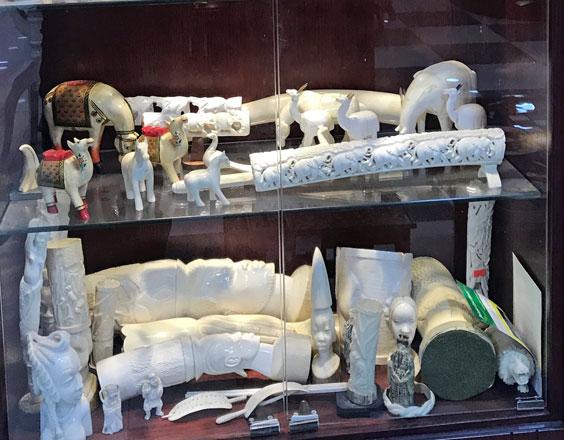You are here
Seized elephant tusks to be destroyed to avoid illegal trade
By Hana Namrouqa - Jan 08,2018 - Last updated at Jan 08,2018

A pair of confiscated elephant tusks will be destroyed in the presence of a wildlife preservation expert (Photo courtesy of the RSCN Facebook page)
AMMAN — The elephant tusks seized and confiscated during a police raid late last week will be destroyed to prevent illicit ivory trade, a conservationist said on Monday.
Preventive Security Department’s (PSD) personnel have confiscated a pair of elephant tusks during a raid on a house in Rusaifeh in Zarqa Governorate, following reports of a person in possession of unlicensed firearms.
The police contacted the Royal Society for the Conservation of Nature (RSCN) and handed the tusks over to the society’s experts.
Head of Law Enforcement Section at the RSCN, Abdul Razzaq Hmoud, said that the two tusks are more than one-metre-long each, noting that, because ivory trade is illegal, tusks are usually sold for hefty amounts of money on the black market.
He noted that one kilogramme of raw or un-worked ivory is sold for $3,000-$8,000 in the black market, noting that the man who was found in possession of the pair of tusks said that he bought them for display purposes.
“The tusks were smuggled into Jordan from a neighbouring country. They either belong to an Asian or African elephant; DNA testing can confirm their origin,” Hmoud told The Jordan Times.
He noted that RSCN experts detected Schreger Lines in the tusks, noting that when such lines are present, the tusks qualify as pieces of elephant ivory.
“The society’s protection and hunting regulation section issued a ticket to the man who was found in possession of the elephant tusks as elephants are globally endangered and are listed under the Convention on International Trade in Endangered Species of Wild Fauna and Flora [CITES],” Hmoud underscored.
A statement issued by the PSD late last week said that the person has been referred for legal action.
“The tusks are now in our possession. We are going to contact the CITES Secretariat in Geneva and notify them with the confiscation,” Hmoud said.
The tusks will remain in the possession of the RSCN and will not be sent back to their country of origin to prevent trade which is in enforcement of the CITES instructions, Hmoud said.
“The tusks will be destroyed under the supervision of a CITES Secretariat,” he said.
The conservationist highlighted that no confiscations of elephant tusks were recorded in Jordan at least during the past five years, but underscored that the RSCN’s teams regularly impound other animals and objects listed under the CITES.
Hmoud hailed the high level of awareness demonstrated by the PSD’s Preventive Security for contacting the society in cases involving wildlife and illicit trade in animals.
“The society will very soon hold training workshops for the Jordan Customs Department staff to raise their awareness about the CITES and related issues,” he added.
Jordan became a signatory to the CITES in 1978. The convention is an international agreement between governments aiming to ensure that the international trade in wild animals and plants does not threaten their survival, according to the convention’s website.
Meanwhile, the 2002 Agriculture Law prohibits trade in wild animals unless a permit is issued allowing the export or import of the animal through the Kingdom, according to the RSCN.
Related Articles
AMMAN — Authorities on Wednesday made the fourth confiscation of ivory since the start of the year, seizing 23 ivory ornaments displayed for
AMMAN — Authorities on Monday seized and confiscated three elephant tusks smuggled into Jordan for trade purposes, according to a conservati
AMMAN — As falconry training thrives during spring, authorities are intensifying inspections in desert areas to prevent the illegal activity


















